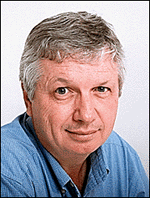


![]()
Talk Story
The president gave a good speech Sunday while American and allied forces ripped into the best targets they could find in the dark of the Taliban's new nightmare. Duty calls another
innocent generation to war"Since Sept. 11," he said, "an entire generation of young Americans has gained new understanding of the value of freedom and its cost and duty and its sacrifice."
I agree, but I wonder if new generations will ever truly understand -- I hope they won't have to.
In Bangor, Maine, in 1944, a blue flag flew from the front porch of my grandparents' home on Maple Street. On it were four gold stars, each a son called to duty.
Charlie was an army private first class. He was Pop's favorite, good at building things -- in fact, he'd enclosed the porch from which the Gold Star flag flew.
Easy-going Tom, the youngest, enlisted right out of high school. He drove trucks through France and into Germany from after D-Day until VE Day and eventually became a sergeant.
Wilfrid, the oldest, was a navy lieutenant. Like John Kennedy, he commanded motor torpedo boats in the South Pacific, sinking thousands of tons of enemy ships.
Joe, my dad, worked at a plant that made clear plastic bomber windows. In May 1944, he was drafted and ended up in Germany as a lieutenant in military intelligence after the surrender.
In Bangor there's a World War II memorial. It's a life-size bronze statue of Uncle Charlie driving a jeep in his battle fatigues and steel helmet.
The telegram had arrived on Sunday, Dec. 17, 1944.
"The Secretary of War asks that I assure you of his deep sympathy in the loss of your son Private First Class Charles A. Flanagan, who was previously reported missing in action. Report now states he was killed in action twenty five November in Germany. Letter follows."
That letter confirmed the telegram and added: "I realize the burden of anxiety that has been yours since he was first reported missing in action and deeply regret the sorrow this later report brings you. May the knowledge that he made the supreme sacrifice for his home and country be a source of sustaining comfort."
He'd been in the lead platoon assaulting the Siegfried Line near Gilsenkirken, a fellow soldier said. "They were opposed by rifle, machine gun and tank machine gun fire. Charlie was killed instantly. He set an example for all the other men in his braveness and coolness up to the end."
On Christmas Eve, a second letter arrived from Gen. George Marshall, Army chief of staff: "Your son fought valiantly in a supreme hour of his country's need. His memory will live in the grateful heart of our nation."
Bing Crosby had a hit song that year, his fifth gold record, called "I'll Be Home for Christmas." It's a hard song for people of that generation to listen to.
Eventually, there was a certificate signed by FDR himself and personal effects: a rusty jackknife, three dollars and change from his pockets.
Tom visited Charlie's grave.
He wrote to Pop: "This morning I crossed the dragon's teeth of the Siegfried Line and went to ... the largest and most beautiful American military cemetery. Almost as far as the eye can see there are white crosses, 8,000 of them lined up no matter what angle you look at them from. And among the first in this Infantry of Sleep is the resting place of your soldier son."
On Sunday the president assured our armed forces that "your mission is defined. The objectives are clear. Your goal is just. You have my full confidence and you will have every tool you will need to carry out your duty."
By God, this time let's hope so.
John Flanagan is the Star-Bulletin's contributing editor.
He can be reached at: jflanagan@starbulletin.com.